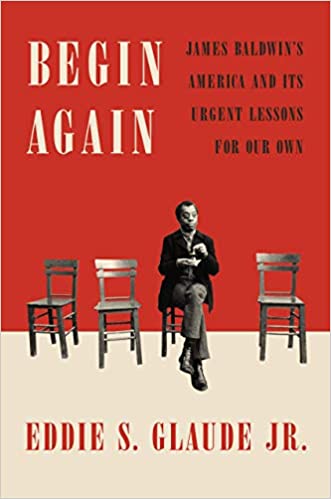By Robert R. Thomas
BEGIN AGAIN by Eddie S. Glaude Jr. is a clear example of a historical genre I call living history, i.e., history being written in real time by living historians. Glaude is the James S. McDonnell Distinguished University Professor of African American Studies at Princeton, where he is also the chair of the Center for African American Studies and the chair of the Department of African American Studies.
Glaude’s perspective of history’s dèjá vu all over again is stated in the book’s subtitle: “James Baldwin’s America And Its Urgent Lessons For Our Own.”
 “It is, alas, the truth that to be an American writer today means mounting an unending attack on all that Americans believe themselves to hold sacred,” Baldwin wrote in 1962. “It means fighting an astute and agile guerrilla warfare with that American complacency which so inadequately masks the American panic.”
“It is, alas, the truth that to be an American writer today means mounting an unending attack on all that Americans believe themselves to hold sacred,” Baldwin wrote in 1962. “It means fighting an astute and agile guerrilla warfare with that American complacency which so inadequately masks the American panic.”
As Glaude notes, “In this sense, Baldwin’s view of the writer was a decidedly moral one. The writer puts aside America’s myths and legends and forces a kind of confrontation with the society as it is, becoming a disturber of the peace in doing so.”
A renowned American writer, Baldwin also became a brilliant critic of America’s conflicted condition: a so-called democracy in which one’s skin color determined the value of one’s life and justified America’s organizational system. The essence of this conflict is the contradiction at the heart of America’s self-understanding.
“Baldwin’s understanding of the American condition,” writes Glaude, “cohered around a set of practices that, taken together, constitute something I will refer to throughout this book as the lie. The idea of facing the lie was always at the heart of Jimmy’s witness, because he thought that it, as opposed to our claim to be the shining city on a hill, was what made America truly exceptional.”
Opening with historical examples of various forms of the lie from revisionist history to the lies we tell ourselves, Glaude distills the forms as a value gap. He adds:
“If what I have called the value gap is the idea that in America white lives have always mattered more than the lives of others, then the lie is a broad and powerful architecture of false assumptions by which the value gap is maintained. These are narrative assumptions that support the everyday order of American life, which means we breathe them like air. We count them as truths. We absorb them into our character.”
As Glaude relates, Baldwin put the lie at the heart of the country’s founding in his 1964 essay “The White Problem.”
“The people who settled this country had a fatal flaw. They could recognize a man when they saw one. They knew he wasn’t … anything else but a man; but since they were Christian, and since they had already decided that they came here to establish a free country, the only way to justify the role this chattel was playing in one’s life was to say that he was not a man. For if he wasn’t, then no crime has been committed. That lie is the basis of our present trouble.”
Glaude’s deft blending of Baldwin’s writing and his own life’s witness to expose the American lie offers myth-busting course corrections on the path to a different America, then and now.
Baldwin, from The Fire Next Time:
To accept one’s past — one’s history — is not the same thing as drowning in it; it is learning how to use it. An invented past can never be used; it cracks and crumbles under the pressures of life like clay in a season of drought. How can the American Negro’s past be used? The unprecedented price demanded — and at this embattled hour of the world’s history — is the transcendence of the realities of color, of nations, of altars.
Glaude examines two critical moments of moral reckoning in our history, the Civil War/ Reconstruction and the black freedom struggle of the mid-twentieth century, both of which failed to create a new America. He views our current national condition as a moral reckoning of the same magnitude.
“We should have learned the lesson by now that changing laws or putting our faith in politicians to do the right thing are not enough,” Glaude writes. “We have to rid ourselves, once and for all, of this belief that white people matter more than others, or we’re doomed to repeat the cycles of our ugly history over and over again.
George Santayana, the Spanish-born American philosopher, was right to point out that ‘those who cannot remember the past are condemned to repeat it.’ But what he didn’t say is that those who willfully refuse to remember become moral monsters.”
Baldwin put it this way: “Ignorance allied with power is the most ferocious enemy of justice.”

Robert Thomas
Glaude’s review of those times and their lessons through Baldwin’s dark and hopeful message is prescient to our current challenge to democracy. By illuminating the dark times in Baldwin’s life, Begin Again also witnesses to Glaude’s hope for that New Jerusalem after which he so mightily sought.
EVM board member and frequent reviewer Robert C. Thomas can be reached at capnz13prod@gmail.com.


You must be logged in to post a comment.